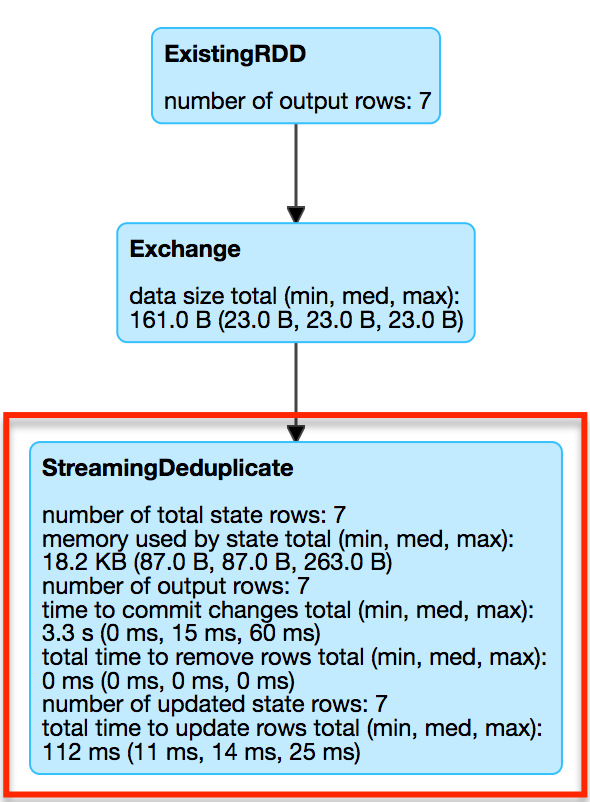
StreamingDeduplicateExec Unary Physical Operator for Streaming Deduplication
StreamingDeduplicateExec is a unary physical operator that writes state to StateStore with support for streaming watermark.
|
Note
|
A unary physical operator ( Read up on UnaryExecNode (and physical operators in general) in The Internals of Spark SQL book. |
StreamingDeduplicateExec is created exclusively when StreamingDeduplicationStrategy plans Deduplicate unary logical operators.

val uniqueValues = spark.
readStream.
format("rate").
load.
dropDuplicates("value") // <-- creates Deduplicate logical operator
scala> println(uniqueValues.queryExecution.logical.numberedTreeString)
00 Deduplicate [value#214L], true
01 +- StreamingRelation DataSource(org.apache.spark.sql.SparkSession@4785f176,rate,List(),None,List(),None,Map(),None), rate, [timestamp#213, value#214L]
scala> uniqueValues.explain
== Physical Plan ==
StreamingDeduplicate [value#214L], StatefulOperatorStateInfo(<unknown>,5a65879c-67bc-4e77-b417-6100db6a52a2,0,0), 0
+- Exchange hashpartitioning(value#214L, 200)
+- StreamingRelation rate, [timestamp#213, value#214L]
// Start the query and hence StreamingDeduplicateExec
import scala.concurrent.duration._
import org.apache.spark.sql.streaming.{OutputMode, Trigger}
val sq = uniqueValues.
writeStream.
format("console").
option("truncate", false).
trigger(Trigger.ProcessingTime(10.seconds)).
outputMode(OutputMode.Update).
start
// sorting not supported for non-aggregate queries
// and so values are unsorted
-------------------------------------------
Batch: 0
-------------------------------------------
+---------+-----+
|timestamp|value|
+---------+-----+
+---------+-----+
-------------------------------------------
Batch: 1
-------------------------------------------
+-----------------------+-----+
|timestamp |value|
+-----------------------+-----+
|2017-07-25 22:12:03.018|0 |
|2017-07-25 22:12:08.018|5 |
|2017-07-25 22:12:04.018|1 |
|2017-07-25 22:12:06.018|3 |
|2017-07-25 22:12:05.018|2 |
|2017-07-25 22:12:07.018|4 |
+-----------------------+-----+
-------------------------------------------
Batch: 2
-------------------------------------------
+-----------------------+-----+
|timestamp |value|
+-----------------------+-----+
|2017-07-25 22:12:10.018|7 |
|2017-07-25 22:12:09.018|6 |
|2017-07-25 22:12:12.018|9 |
|2017-07-25 22:12:13.018|10 |
|2017-07-25 22:12:15.018|12 |
|2017-07-25 22:12:11.018|8 |
|2017-07-25 22:12:14.018|11 |
|2017-07-25 22:12:16.018|13 |
|2017-07-25 22:12:17.018|14 |
|2017-07-25 22:12:18.018|15 |
+-----------------------+-----+
// Eventually...
sq.stopStreamingDeduplicateExec uses the performance metrics of StateStoreWriter.

The output schema of StreamingDeduplicateExec is exactly the child's output schema.
The output partitioning of StreamingDeduplicateExec is exactly the child's output partitioning.
/**
// Start spark-shell with debugging and Kafka support
SPARK_SUBMIT_OPTS="-agentlib:jdwp=transport=dt_socket,server=y,suspend=n,address=5005" \
./bin/spark-shell \
--packages org.apache.spark:spark-sql-kafka-0-10_2.11:2.3.0-SNAPSHOT
*/
// Reading
val topic1 = spark.
readStream.
format("kafka").
option("subscribe", "topic1").
option("kafka.bootstrap.servers", "localhost:9092").
option("startingOffsets", "earliest").
load
// Processing with deduplication
// Don't use watermark
// The following won't work due to https://issues.apache.org/jira/browse/SPARK-21546
/**
val records = topic1.
withColumn("eventtime", 'timestamp). // <-- just to put the right name given the purpose
withWatermark(eventTime = "eventtime", delayThreshold = "30 seconds"). // <-- use the renamed eventtime column
dropDuplicates("value"). // dropDuplicates will use watermark
// only when eventTime column exists
// include the watermark column => internal design leak?
select('key cast "string", 'value cast "string", 'eventtime).
as[(String, String, java.sql.Timestamp)]
*/
val records = topic1.
dropDuplicates("value").
select('key cast "string", 'value cast "string").
as[(String, String)]
scala> records.explain
== Physical Plan ==
*Project [cast(key#0 as string) AS key#249, cast(value#1 as string) AS value#250]
+- StreamingDeduplicate [value#1], StatefulOperatorStateInfo(<unknown>,68198b93-6184-49ae-8098-006c32cc6192,0,0), 0
+- Exchange hashpartitioning(value#1, 200)
+- *Project [key#0, value#1]
+- StreamingRelation kafka, [key#0, value#1, topic#2, partition#3, offset#4L, timestamp#5, timestampType#6]
// Writing
import org.apache.spark.sql.streaming.{OutputMode, Trigger}
import scala.concurrent.duration._
val sq = records.
writeStream.
format("console").
option("truncate", false).
trigger(Trigger.ProcessingTime(10.seconds)).
queryName("from-kafka-topic1-to-console").
outputMode(OutputMode.Update).
start
// Eventually...
sq.stop|
Tip
|
Enable Add the following line to Refer to Logging. |
Executing Physical Operator (Generating RDD[InternalRow]) — doExecute Method
doExecute(): RDD[InternalRow]|
Note
|
doExecute is part of SparkPlan Contract to generate the runtime representation of an physical operator as a distributed computation over internal binary rows on Apache Spark (i.e. RDD[InternalRow]).
|
Internally, doExecute initializes metrics.
doExecute executes child physical operator and creates a StateStoreRDD with storeUpdateFunction that:
-
Generates an unsafe projection to access the key field (using keyExpressions and the output schema of child).
-
Filters out rows from
Iterator[InternalRow]that matchwatermarkPredicateForData(when defined and timeoutConf isEventTimeTimeout) -
For every row (as
InternalRow)-
Extracts the key from the row (using the unsafe projection above)
-
Gets the saved state in
StateStorefor the key -
(when there was a state for the key in the row) Filters out (aka drops) the row
-
(when there was no state for the key in the row) Stores a new (and empty) state for the key and increments numUpdatedStateRows and numOutputRows metrics.
-
-
In the end,
storeUpdateFunctioncreates aCompletionIteratorthat executes a completion function (akacompletionFunction) after it has successfully iterated through all the elements (i.e. when a client has consumed all the rows).The completion function does the following:
-
Updates allUpdatesTimeMs metric (that is the total time to execute
storeUpdateFunction) -
Updates allRemovalsTimeMs metric with the time taken to remove keys older than the watermark from the StateStore
-
Updates commitTimeMs metric with the time taken to commit the changes to the StateStore
-
Creating StreamingDeduplicateExec Instance
StreamingDeduplicateExec takes the following when created:
-
Duplicate keys (as used in dropDuplicates operator)
Checking Out Whether Last Batch Execution Requires Another Non-Data Batch or Not — shouldRunAnotherBatch Method
shouldRunAnotherBatch(newMetadata: OffsetSeqMetadata): Boolean|
Note
|
shouldRunAnotherBatch is part of the StateStoreWriter Contract to indicate whether MicroBatchExecution should run another non-data batch (based on the updated OffsetSeqMetadata with the current event-time watermark and the batch timestamp).
|
shouldRunAnotherBatch…FIXME